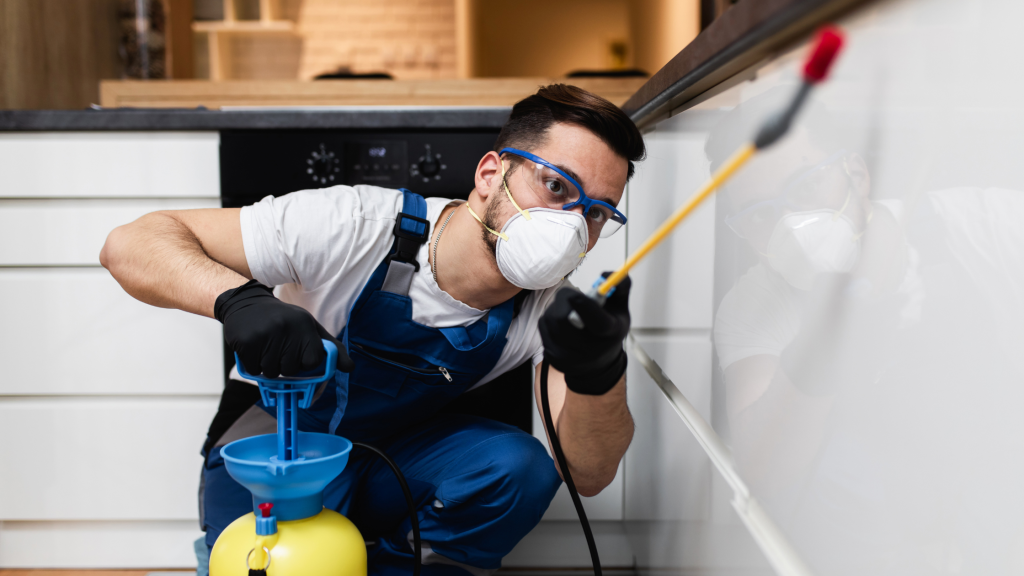Premier Pest Control Clovis Solutions: Your Comfort
Premier Pest Control Clovis Solutions: Your Comfort
Blog Article
Comprehending the Numerous Methods to Pest Control: A Comprehensive Guide

All-natural Bug Control Approaches
Utilizing environment-friendly methods such as companion growing and organic insect control is important for effectively taking care of bugs in agricultural setups. Buddy planting entails growing different plants in proximity to deter pests, boost nutrient uptake, and improve total crop wellness.
Biological pest control entails introducing all-natural killers or pathogens to regulate pest populations. Ladybugs, as an example, feed upon aphids, regulating their numbers without the requirement for chemical pesticides. An additional example is making use of Bacillus thuringiensis (Bt), a germs that targets specific insect bugs while being harmless to people, pets, and useful insects.
These environment-friendly methods not just reduce the reliance on artificial pesticides however additionally help maintain biodiversity and soil health. By integrating all-natural insect control approaches into agricultural techniques, farmers can achieve sustainable pest administration while decreasing negative effects on the setting.

Chemical Insect Control Solutions
In enhancement to natural bug control approaches, the utilization of chemical pest control services plays a substantial duty in effectively managing pest populations in agricultural environments. Chemical insect control options are created to target details parasites that might cause extensive damages to crops. These solutions typically consist of artificial chemicals that are created to get rid of parasites promptly and effectively.
Among the crucial benefits of chemical bug control options is their efficiency in managing insect infestations widespread. Farmers can apply these services utilizing various methods such as splashing, airing out, or seed therapy to safeguard their crops from hazardous pests, weeds, and conditions. Furthermore, chemical bug control options are relatively very easy to use and can give quick outcomes, aiding farmers secure their returns and minimize economic losses.
Nevertheless, it is vital to make use of chemical pest control options carefully to lessen possible unfavorable influence on the atmosphere, non-target microorganisms, and human wellness. Appropriate application techniques, adherence to security standards, and regular tracking are critical to make sure the responsible use of chemical insect control solutions in farming practices.
Organic Parasite Control Approaches
Biological pest control comes close to leverage natural killers or microorganisms to take care of bug populaces in agricultural settings efficiently. One common biological control approach is the introduction of natural adversaries, such as ladybugs or parasitical wasps, to target particular bugs.
An additional biological control approach includes utilizing virus like fungi, germs, or infections to contaminate and kill pests. Overall, organic bug control approaches offer a sustainable and targeted remedy to pest monitoring in agriculture.
Integrated Parasite Management (IPM)
Integrated Parasite Management (IPM) is a comprehensive method that integrates numerous parasite control techniques to properly handle and minimize pest populaces in agricultural systems. IPM concentrates on long-term prevention of bugs through a combination of biological, cultural, physical, and chemical control methods. By integrating these different strategies, IPM intends to reduce reliance on chemical pesticides, lessen environmental impact, and advertise lasting parasite administration methods.
One secret aspect of IPM is using organic controls such as natural predators, bloodsuckers, and microorganisms to control pest populations. This approach utilizes the power of nature to maintain an equilibrium between bugs and their all-natural adversaries without causing damage to the setting.
Additionally, IPM includes cultural practices like crop habitat, rotation, and cleanliness adjustment to create negative problems for parasites and disrupt their life cycles. Physical controls such as mulches, obstacles, and catches are likewise used to avoid insect infestations.
Physical and mechanical Pest Control Techniques
Utilizing non-chemical approaches, such Full Article as mechanical and physical pest control methods, is an essential facet of extensive bug management strategies, building on the foundation of Integrated Insect Monitoring's alternative approach. Mechanical parasite control includes using physical barriers or catches to stop bugs from accessing and damaging crops or structures. This technique can consist of techniques like setting up screens on windows, making use of row covers in farming, or using sticky traps to catch insects.
Physical insect control techniques, on the other hand, focus on directly eliminating insects via physical methods. As an example, utilizing warm therapies to get rid of bed insects or vacuuming up pests like spiders or ants can be reliable means to take care of invasions without making use of chemicals. By incorporating these mechanical and physical pest control techniques right into an Integrated Pest Monitoring plan, specialists and people can decrease reliance on chemicals while still successfully managing pest populations and decreasing damages.
Conclusion

In enhancement to natural pest control approaches, the usage of chemical pest control options plays a considerable role in click here to find out more successfully managing pest populaces in agricultural settings.One of the essential benefits of chemical bug control solutions is their performance in controlling parasite invasions on a huge scale.Integrated Parasite Management (IPM) is a thorough method that incorporates different parasite control techniques to properly handle and decrease pest populations in farming systems.Making use of non-chemical techniques, such as physical and mechanical insect control strategies, is an important facet of extensive bug management techniques, constructing upon the structure of Integrated Insect Administration's all natural method. By including these physical and mechanical insect control methods right into an Integrated Parasite Management plan, professionals and individuals can minimize dependence on chemicals while still effectively decreasing and taking care of pest populations damage.
Report this page